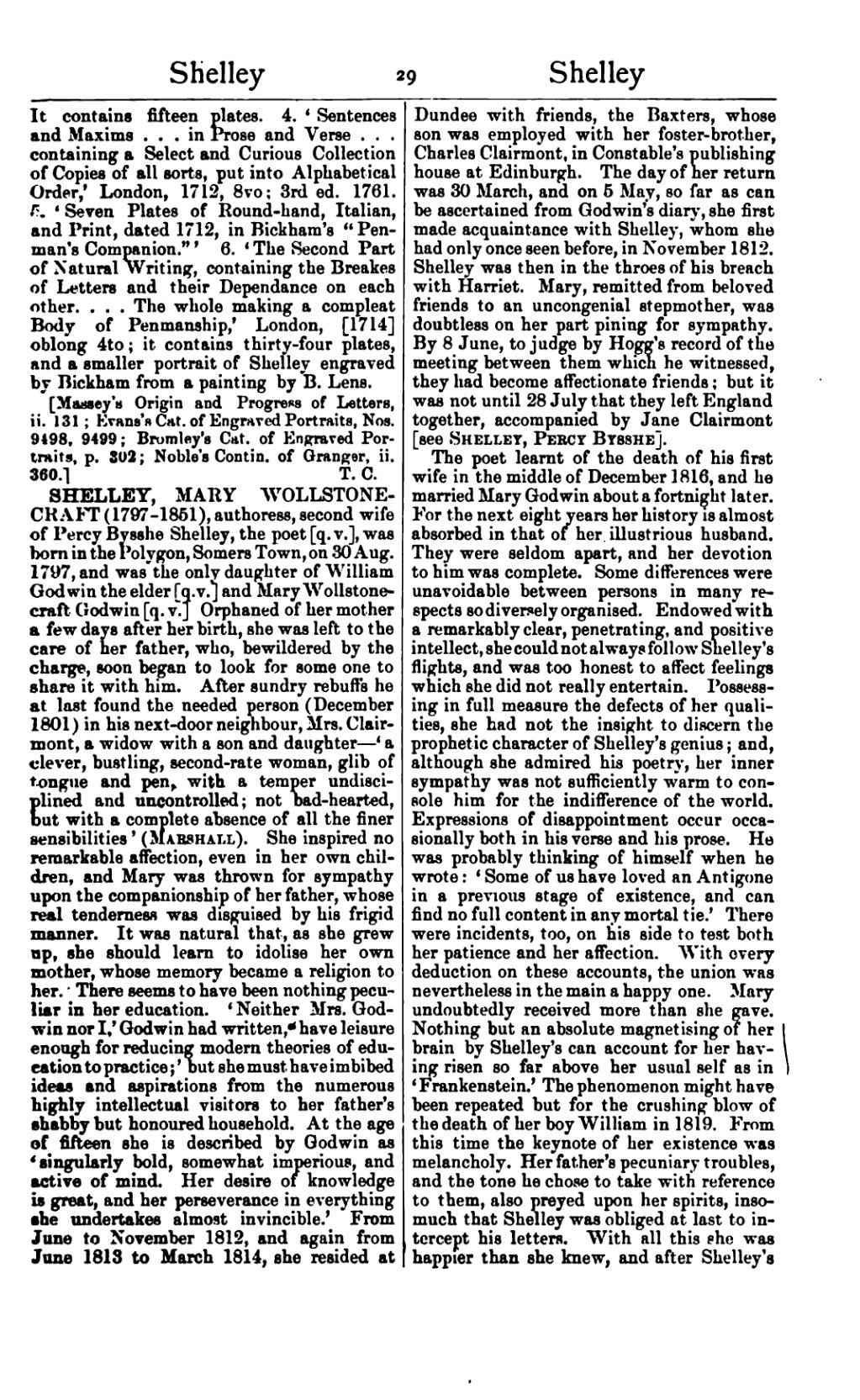- It contains fifteen plates.
- ‘Sentences and Maxims … in Prose and Verse … containing a Select and Curious Collection of Copies of all sorts, put into Alphabetical Order,’ London, 1712, 8vo; 3rd ed. 1761.
- ‘Seven Plates of Round-hand, Italian, and Print, dated 1712, in Bickham's “Penman's Companion.”’
- ‘The Second Part of Natural Writing, containing the Breakes of Letters and their Dependance on each other. … The whole making a compleat Body of Penmanship,’ London, [1714] oblong 4to; it contains thirty-four plates, and a smaller portrait of Shelley engraved by Bickham from a painting by B. Lens.
[Massey's Origin and Progress of Letters, ii. 131; Evans's Cat. of Engraved Portraits, Nos. 9498, 9499; Bromley's Cat. of Engraved Portraits, p. 302; Noble's Contin. of Granger, ii. 360; De Morgan's Arithmetical Books, 1847, p. 73.]
SHELLEY, MARY WOLLSTONECRAFT (1797–1851), authoress, second wife of Percy Bysshe Shelley, the poet [q. v.], was born in the Polygon, Somers Town, on 30 Aug. 1797, and was the only daughter of William Godwin the elder [q. v.] and Mary Wollstonecraft Godwin [q. v.] Orphaned of her mother a few days after her birth, she was left to the care of her father, who, bewildered by the charge, soon began to look for some one to share it with him. After sundry rebuffs he at last found the needed person (December 1801) in his next-door neighbour, Mrs. Clairmont, a widow with a son and daughter—‘a clever, bustling, second-rate woman, glib of tongue and pen, with a temper undisciplined and uncontrolled; not bad-hearted, but with a complete absence of all the finer sensibilities’ (Marshall). She inspired no remarkable affection, even in her own children, and Mary was thrown for sympathy upon the companionship of her father, whose real tenderness was disguised by his frigid manner. It was natural that, as she grew up, she should learn to idolise her own mother, whose memory became a religion to her. There seems to have been nothing peculiar in her education. ‘Neither Mrs. Godwin nor I,’ Godwin had written, ‘have leisure enough for reducing modern theories of education to practice;’ but she must have imbibed ideas and aspirations from the numerous highly intellectual visitors to her father's shabby but honoured household. At the age of fifteen she is described by Godwin as ‘singularly bold, somewhat imperious, and active of mind. Her desire of knowledge is great, and her perseverance in everything she undertakes almost invincible.’ From June to November 1812, and again from June 1813 to March 1814, she resided at Dundee with friends, the Baxters, whose son was employed with her foster-brother, Charles Clairmont, in Constable's publishing house at Edinburgh. The day of her return was 30 March, and on 5 May, so far as can be ascertained from Godwin's diary, she first made acquaintance with Shelley, whom she had only once seen before, in November 1812. Shelley was then in the throes of his breach with Harriet. Mary, remitted from beloved friends to an uncongenial stepmother, was doubtless on her part pining for sympathy. By 8 June, to judge by Hogg's record of the meeting between them which he witnessed, they had become affectionate friends; but it was not until 28 July that they left England together, accompanied by Jane Clairmont [see Shelley, Percy Bysshe].
The poet learnt of the death of his first wife in the middle of December 1816, and he married Mary Godwin about a fortnight later. For the next six years her history is almost absorbed in that of her illustrious husband. They were seldom apart, and her devotion to him was complete. Some differences were unavoidable between persons in many respects so diversely organised. Endowed with a remarkably clear, penetrating, and positive intellect, she could not always follow Shelley's flights, and was too honest to affect feelings which she did not really entertain. Possessing in full measure the defects of her qualities, she had not the insight to discern the prophetic character of Shelley's genius; and, although she admired his poetry, her inner sympathy was not sufficiently warm to console him for the indifference of the world. Expressions of disappointment occur occasionally both in his verse and his prose. He was probably thinking of himself when he wrote: ‘Some of us have loved an Antigone in a previous stage of existence, and can find no full content in any mortal tie.’ There were incidents, too, on his side to test both her patience and her affection. With every deduction on these accounts, the union was nevertheless in the main a happy one. Mary undoubtedly received more than she gave. Nothing but an absolute magnetising of her brain by Shelley's can account for her having risen so far above her usual self as in ‘Frankenstein.’ The phenomenon might have been repeated but for the crushing blow of the death of her boy William in 1819. From this time the keynote of her existence was melancholy. Her father's pecuniary troubles, and the tone he chose to take with reference to them, also preyed upon her spirits, insomuch that Shelley was obliged at last to intercept his letters. With all this she was happier than she knew, and after Shelley's
